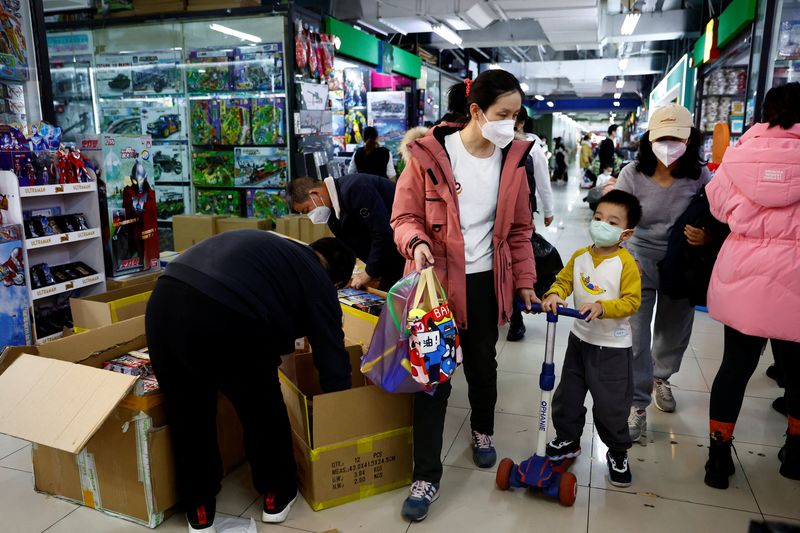
©Reuters. FILE PHOTO: A woman and a child walk past workers sorting toys at a shopping mall in Beijing, China, January 11, 2023. REUTERS/Tingshu Wang
BEIJING (Reuters) – Services activity in China grew at a slightly slower pace in January as new orders fell, a private sector survey showed on Monday, suggesting a weak start for the world’s second-largest economy in a context of tepid demand and real estate collapse.
The Caixin/S&P Global Services Purchase Managers’ Index (PMI) fell to 52.7 from 52.9 in December, but remained above the 50 threshold that separates expansion from contraction for a 13th month consecutive.
The figure comes after official data last week showed industrial activity contracted again, offering a snapshot of the state of the economy at the start of the year.
China’s economy is struggling to regain momentum, facing multiple challenges including persistent deflationary pressures, a prolonged real estate downturn and rising local government debt.
The government is drawing on a well-used approach of using public debt to finance infrastructure to help lift the economy as consumers are wary of spending amid income uncertainty.
In January, new orders grew at a slower pace with the index falling to 51.5 from 53.7 in December. Companies, therefore, marginally increased the number of employees for the second consecutive month, the survey said.
The sub-index of prices charged fell for the first time since April 2022. According to the survey, several companies monitored reduced their rates to attract new customers and increase sales.
“The economy faces significant challenges, characterized by numerous uncertainties and adverse factors,” said Wang Zhe, senior economist at Caixin Insight Group. “This status quo has yet to undergo a fundamental reversal.”
Service sector business confidence for the year ahead was the lowest in three months.
The Caixin/S&P composite PMI fell to 52.5 last month from 52.6 in December.
“Given that there is still room for further adjustments in fiscal and monetary policies, policy measures need to be strengthened,” Wang said. “It is critical that policies facilitate effective communication and positive interaction with the market.”
The country will maintain fiscal expansion this year to spur economic recovery, Vice Finance Minister Wang Dongwei said last week, reinforcing market view that public spending will be the government’s main tool to boost growth .